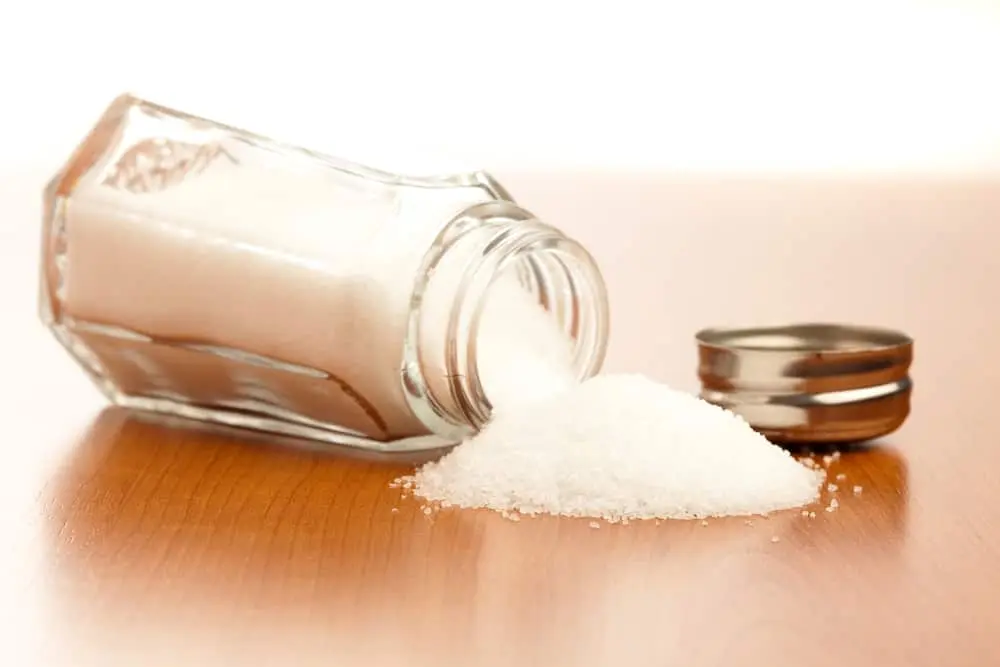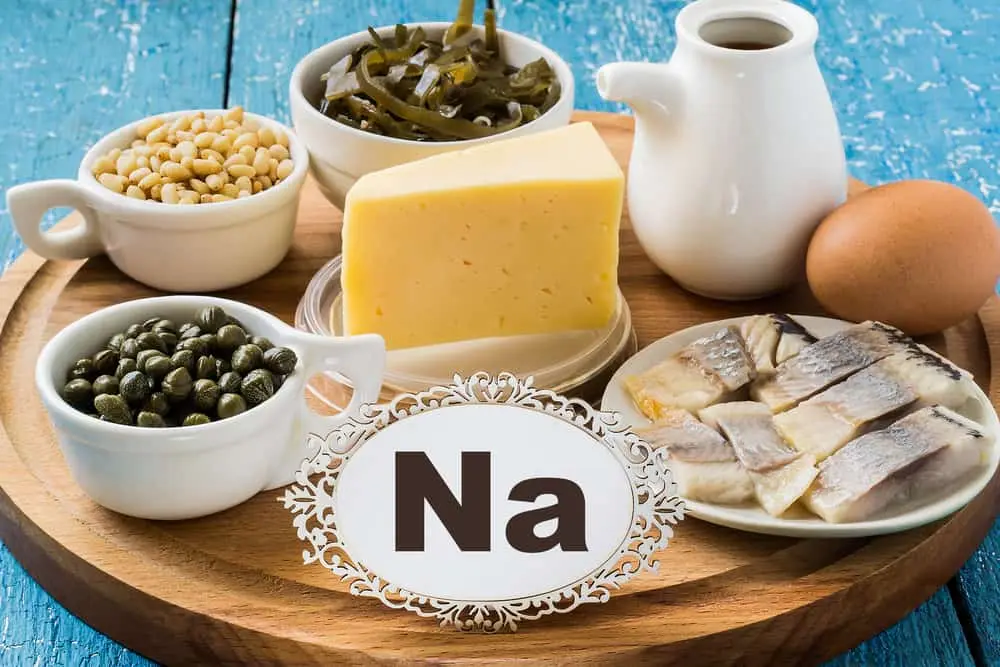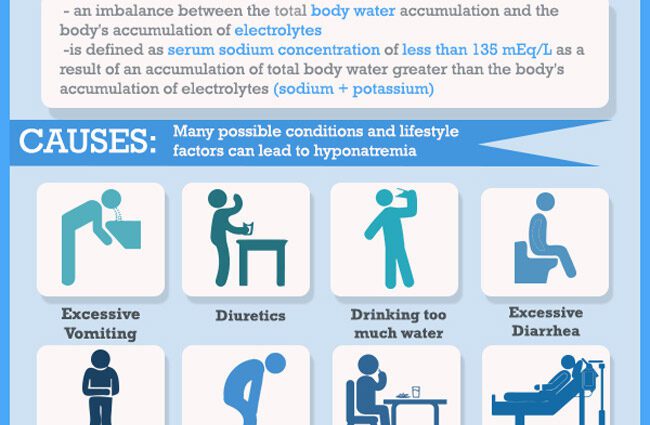Contents
Does hyponatremia speak to you? Behind this barbaric word hides a very simple definition: it is the lack of sodium in our body (1). If I tell you sodium, you think of salt and you automatically remember that you have to limit your consumption …
You are right, but beware, sodium is not just an enemy and it is even essential for our health if it is consumed in moderation!
I will try to explain to you why sodium is essential for our organism, how to find out if it is lacking and what to do to remedy it in this case of figure.
What is sodium?
Let us first come back to a detailed presentation of the properties of sodium. It is an electrolyte, that is to say a mineral salt which circulates in the blood and which brings precious elements to the human body.
It works with potassium and chloride to ensure the proper distribution of water throughout the body. Sodium is also useful for the proper functioning of nerves and muscles.
It is for all of these reasons that we naturally seek to eat salty foods.
Why do you need to consume sodium?

If sodium is essential to our life, it is because it has an essential role to play in our body.
It maintains the water level in the body (remember that we are made up of more than 65% liquid element) and regulates the amount of extracellular fluid.
During intense efforts or when the outside temperature is too high, sodium intervenes to prevent dehydration, sunstroke and muscle contractures.
It is also an essential element for our brain: it improves the functioning of brain cells and helps us, so to speak, to “keep our minds clear” and all our faculties of concentration.
Sodium is also good for our heart (it keeps blood pressure stable) and for our cells because it helps in the optimal absorption of glucose.
Little known fact, it is present in most anti aging creams because it is an ally against the free radicals responsible for the degeneration of the tissues.
Finally, sodium helps our body to get rid of carbon dioxide and maintains a balance between positively charged ions and negatively charged ions.
We understand better with this long list of arguments why humans absolutely need to consume sodium in their daily diet.
According to nutritional experts (2), our body requires between 1500 and 2300 mg of sodium per day, knowing that 1 gram of basic table salt contains 0,4 grams of sodium.
There is normally no need to salt the dishes because the modern diet already contains enough salt to meet the recommended daily allowance.
But not too much…
The most common problem encountered in our society is excess sodium in the blood. Indeed, the French ingest on average between 2000 to 4800 mg of sodium per day …
This is too much, given that our consumption should not exceed 2300 mg! This excess is due to industrial food (ready-made meals, overly salty sauces, etc.) which generally do not skimp on salt intake.
However, excess sodium can have serious consequences for the body, which public opinion is gradually starting to recognize. You may be thirsty all the time without being able to hydrate yourself properly.
Stomach ulcers, kidney stones, hypertension… The health problems caused by excess sodium are real and must be taken seriously.
What are the symptoms of sodium deficiency?

Even if, as we have just seen, it is more common to suffer from an excess than a lack of sodium because of our excessively salty diet, the opposite problem also exists.
It is often more difficult to detect precisely because we tend to think that we ingest more than enough salt, and therefore sodium, during our meals.
In a case of sodium deficiency, you should experience an unexplained water repulsion and experience vomiting and diarrhea.
In the longer term, you will experience nausea, dizziness and frequent loss of balance. You should also trail yourself weaker, lose weight, and be constantly low on energy.
The most serious symptoms of sodium deficiency occur in the brain: headaches quickly give way to mental confusion, intellectual lethargy, and difficulty thinking and expressing themselves correctly.
These symptoms can be difficult to identify in children and the elderly with dementia, for example.
When sodium deficiency sets in over time, the health effects can be extremely serious. Muscle convulsions may occur, followed by a state of listlessness leading to coma. But it is of course very rare to get that far …
What are the consequences of a lack of sodium on health?
Beyond the most glaring symptoms, a lack of sodium can take a long time to be identified and cause real damage to your health.
First of all, cholesterol and trigylceride levels tend to increase, which can lead to cardiovascular disease.
Another problem that can be triggered in the long term: sodium deficiency increases insulin resistance, which can lead to diabetes.
According to a study (3), people who already have diabetes are also at increased risk of having a stroke or cardiac arrest.
What are the causes of sodium deficiency?
If you suspect a lack of sodium, it is necessary to establish a diagnosis quickly in order to be able to remedy it. Hyponatremia is detected by a simple blood test that will measure your sodium level in the blood.
On the other hand, it is a little more complicated to understand what are the causes of your condition; only your doctor can establish them with certainty.
Among the most common causes is severe dehydration due to diarrhea or vomiting. It is a vicious circle because the fact of lack of sodium causes precisely these kinds of symptoms!
Kidney, hormonal or heart disease can also be the cause. In particular, people who sweat a lot may lack sodium.
Finally, the fact of being in a state of malnutrition or of fasting voluntarily leads of course to strong nutritional deficiencies.
Another case which occurs in particular in elderly people: that of “water intoxication”. In the event of a heat wave, older people are often recommended to drink plenty of water.
They follow this advice so closely that they can become poisoned and suffer from hyponatremia. Indeed, the amount of water in their body becomes too large compared to the amount of sodium, which produces this imbalance.
People in hospital can also be prone to “water poisoning”, so their blood sodium levels should be monitored.
How to remedy the lack of sodium?

There are several ways to rebalance your sodium level in your blood.
This starts with emergency measures if you are truly severely deficient, such as giving sodium solution through an infusion over several days.
You must then reduce your water consumption, without becoming dehydrated of course … Drink only one liter of water per day instead of 1,5 / 2 liters usually.
This will help you because it will release less sodium by going to the bathroom and sweating. Be careful, however, to continue to drink enough in the heat or if you practice strenuous physical activity.
In this case, you can consume energy drinks to recover the sodium electrolytes that you lost during your effort.
You will also need to review your diet to increase your sodium level. Eat lots of fruits and vegetables, both fresh and not industrially prepared.
White beans, sweet potatoes, spinach, carrots, celery and olives are among the vegetables with the highest sodium content. For fruit, go for guavas, apricots and passion fruits instead, even if they are not the easiest to find all year round.
When it comes to meats, cold cuts obviously contain a lot of salt and therefore sodium, but we must admit that this is not ideal for our health… Eat meatloaf or beef stew instead.
Cheese, soy sauce, caviar and broths and soups are also good allies for increasing sodium consumption.
Be careful not to make your case worse if you lack sodium! For example, it is highly inadvisable to take diuretic drugs which will cause you to eliminate even more water and therefore sodium from your body.
Unless your doctor has prescribed them for you, it is better to resort to another treatment.
Conclusion
In conclusion, sodium is an essential building block for your body and not getting enough sodium can cause you immediately noticeable problems, such as headaches, vomiting, nausea, and mental confusion.
The potential implications can be very serious and lead to heart problems and insulin resistance. Although it is more common to consume too much sodium rather than not enough, it is important to be careful not to miss this essential nutrient.
If you have any doubts, do not hesitate to contact your doctor and take a blood test to be sure.
Fortunately, it is quite easy to remedy a sodium deficiency. Even if the first instinct is to have a heavy hand on the salt shaker at the table, it is a heresy in the same way as if you threw yourself on a fatty and too salty industrial food!
Instead, bet on smart foods like vegetables, broths or caviar to fill up with sodium in the best way.
Do not forget either to reduce your water consumption as much as possible and to supplement yourself with electrolytes through energy drinks if necessary.
With all these tips, you should quickly find a reasonable level of sodium in your body.











ಧನ್ಯವಾದಗಳು